Corbett dodges protesters to name Green SRC chair
-

-

-

-

-
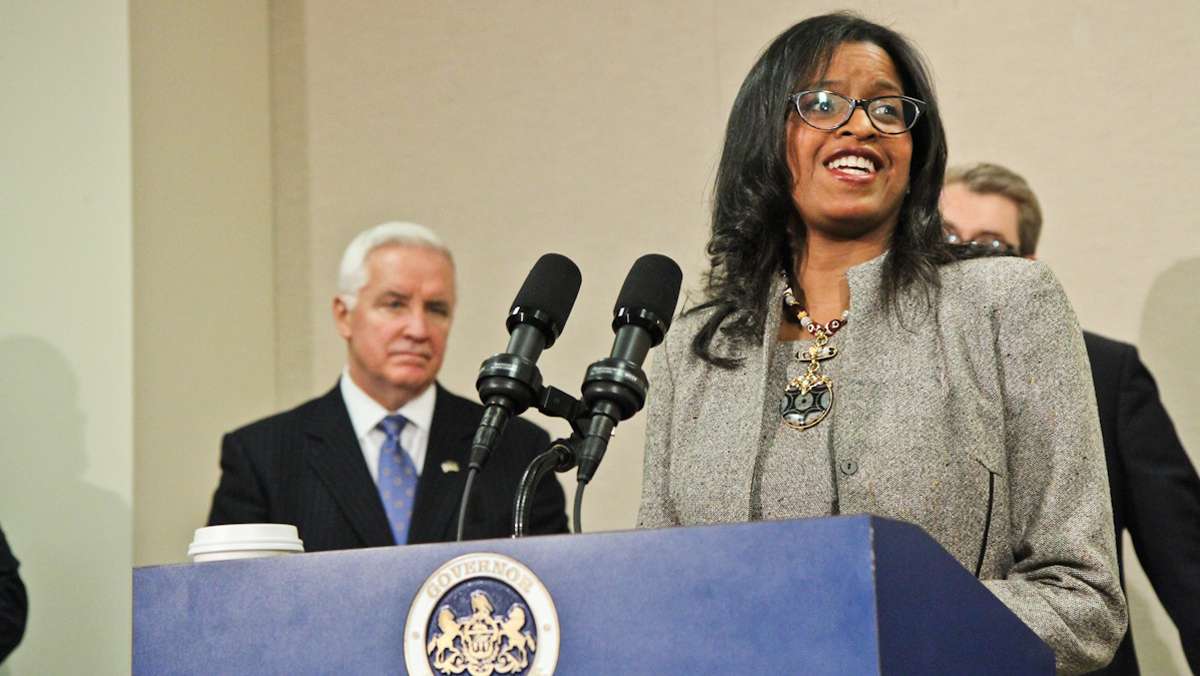
-
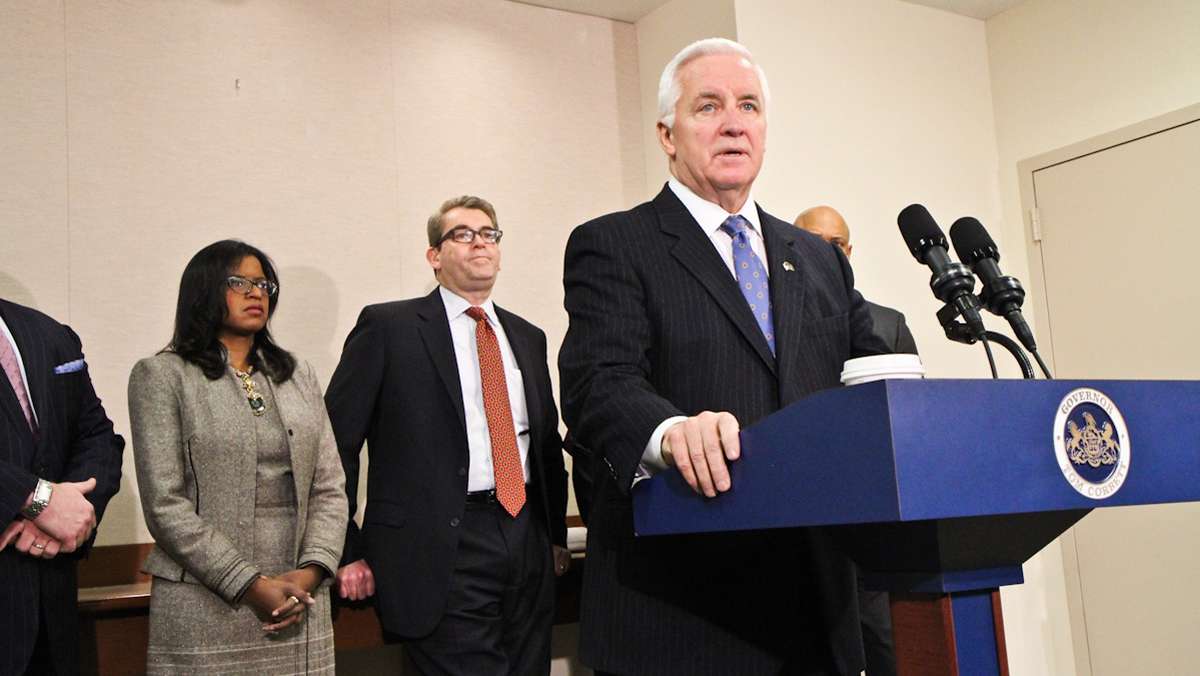
-
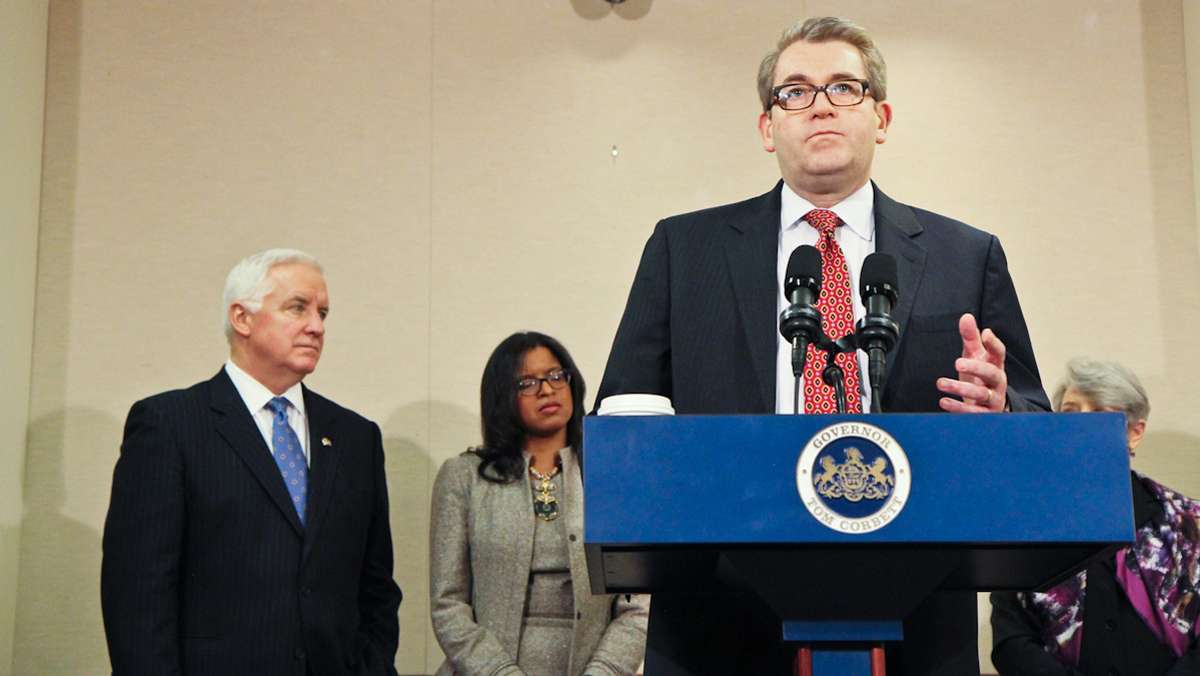
-

-

-

-

-
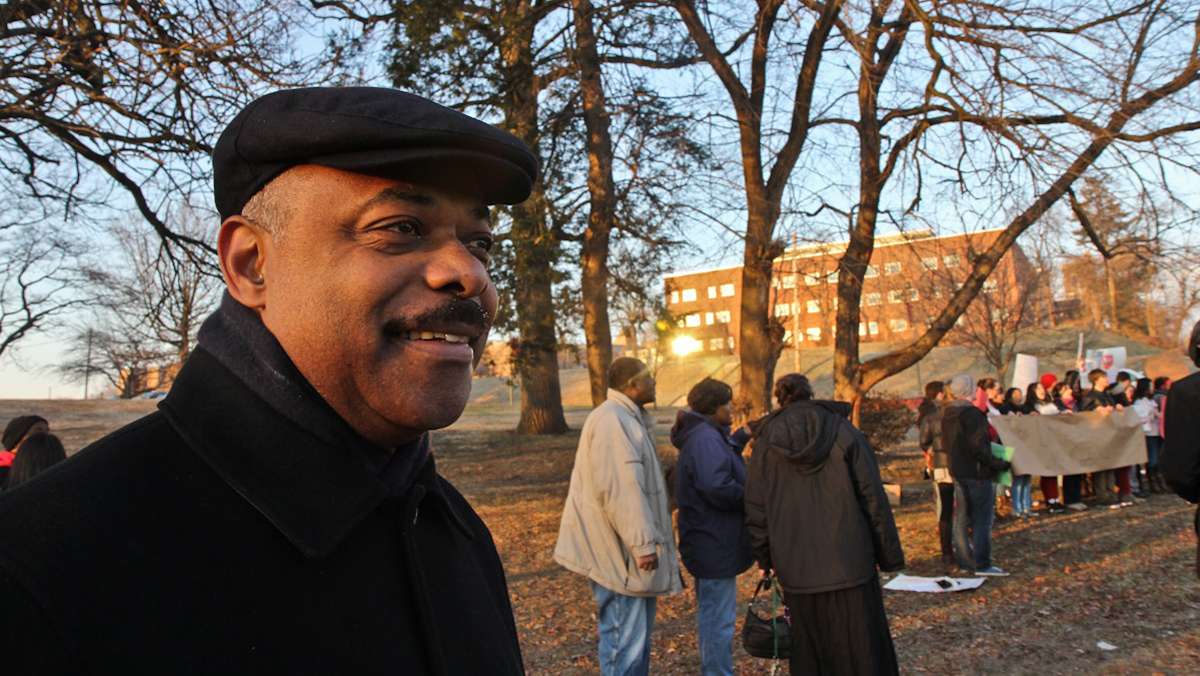
-
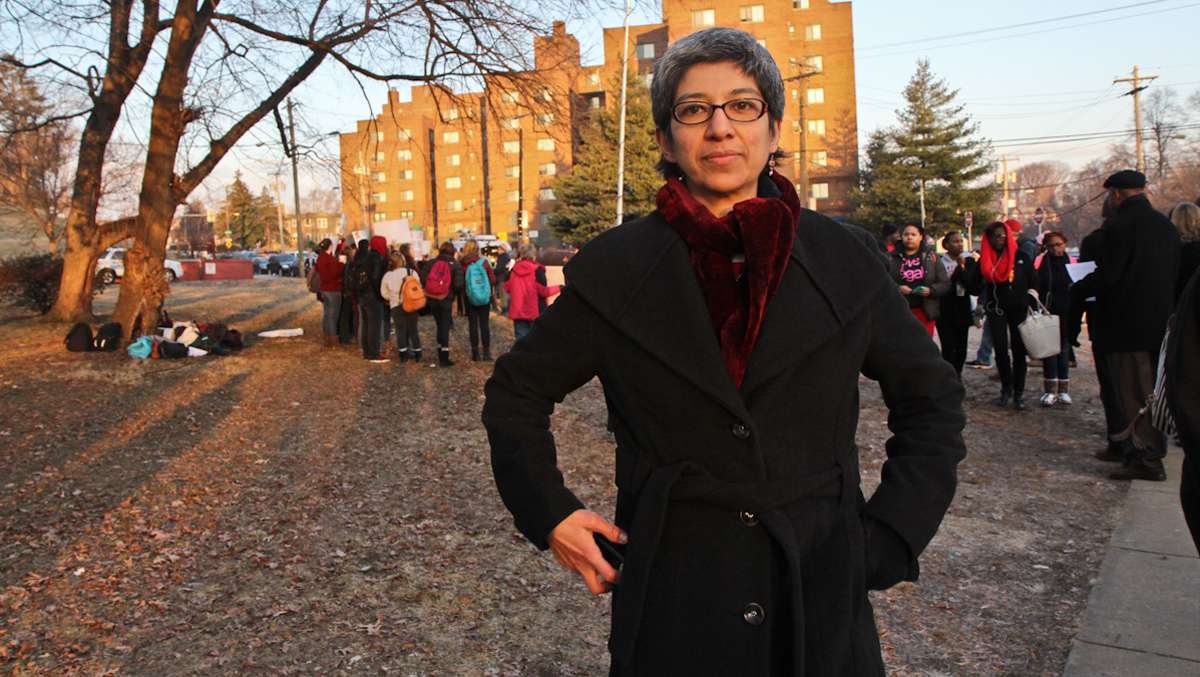
-
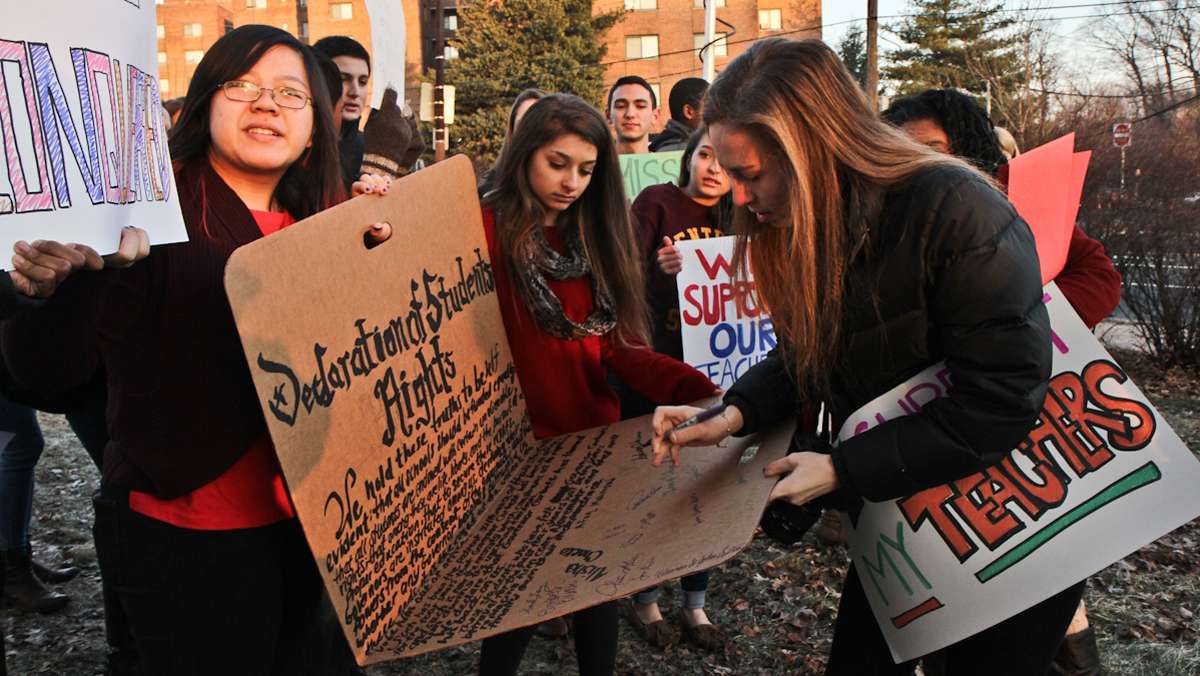
Central senior Dalya Hahan signs a Declaration of Student rights at a rally held outside the school prior to a visit from Pa Governor Corbett. (Kimberly Paynter/WHYY)
-

-
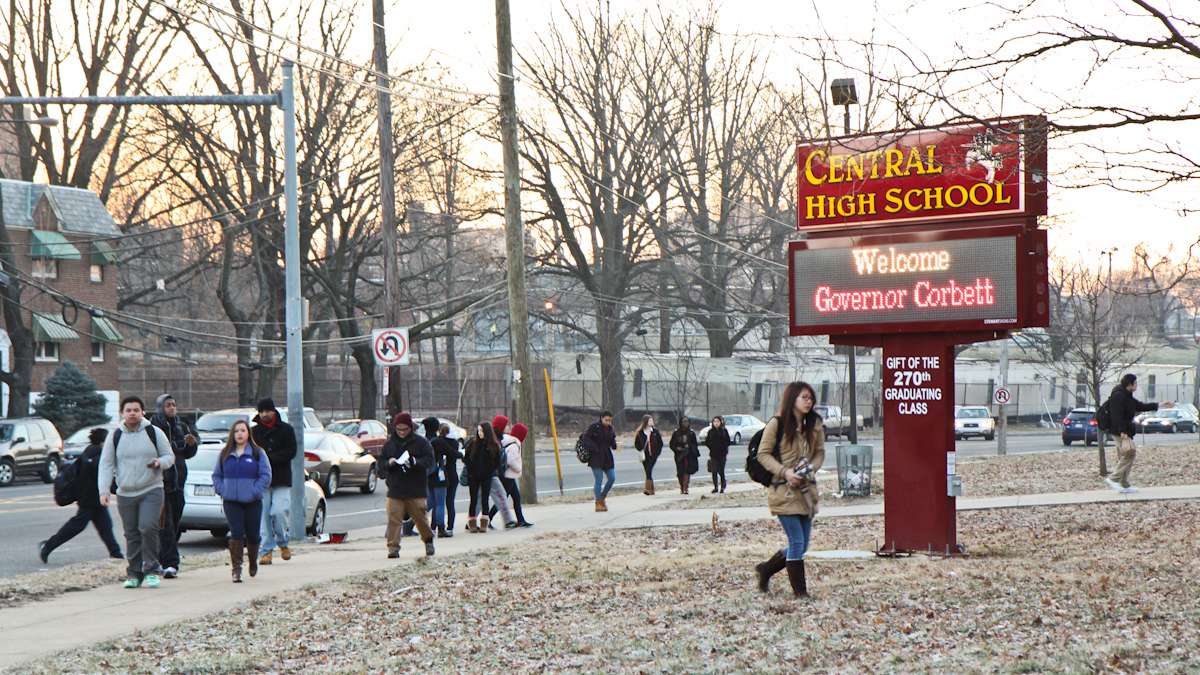
Gov. Tom Corbett selects City Councilman Bill Green to chair the SRC and Farah Jimenez to replace the SRC’s outgoing commissioner — but a last minute venue change leaves students out in the cold.
On a frigid January morning nearly halfway through a school year marked by draconian cuts to services and staff, Gov. Tom Corbett — plagued by a low approval rating and an impending November election — braved the eastbound lanes of the Turnpike to make his first gubernatorial appearance at a Philadelphia traditional public school.
At least that’s the way it was written up in the playbook.
Instead, in a last-minute audible, Corbett changed the event’s venue to his office at the Philadelphia Chamber of Commerce, and changed the news narrative to his nomination of two new School Reform Commissioners he said would bring the city “fresh talent and true dedication.”
Corbett selected Philadelphia City Councilman Bill Green to chair the SRC and Farah Jimenez, leader of West Philadelphia’s People’s Emergency Center, to replace outgoing commissioner Joseph Dworetzky.
Green will fill the spot left vacant when Pedro Ramos resigned in October.
Of Green, Corbett told reporters that “he has a long history of public involvement, holding fast to the idea that public involvement, public service is an honorable calling … it must always be for doing what’s best for the people.” Listen here for an extended interview with Bill Green.
Of Jimenez, Corbett said, “like Bill, she has a notable history of public service and personal accomplishment ranging from a law degree from Penn to a career devoted to lifting people out of poverty. Clearly, Farah is a woman with a talent for confronting complex problems and finding ways to help people affected by them.”
Green called the appointment “an opportunity to do something for the city of Philadelphia that can have us approach two million citizens again in 40 or 50 years.”
Before assuming the SRC posts, Green and Jimenez will need the approval of Pennsylvania’s Senate.
Appointees
Although he didn’t want to discuss specifics until conferencing with Superintendent Hite, Green confirmed that his tenure as SRC chair would reflect the philosophy of the education-related position papers he’s published in recent years. In those, he imagines a Philadelphia’s system of public education that’s much more friendly to charter schools and much less so to teachers unions.
Asked his opinon about the SRC’s power to impose contract terms on the Philadelphia Federation of Teachers (who’ve been working under an expired contract since August 31st), Green said:
“The SRC has broad powers to do what it needs to do…and it should use all of the powers that it has to ensure that it’s doing the best it can for the city’s children…We have some great schools and teachers in Philadelphia. We have some poor performing teachers and schools in Philadelphia. We should have none of them.”
Farah Jimenez, who works with a population of homeless women–60-percent of whom she says have incomplete eduactions – said there’s “nothing more important to combat homelessness than creating great schools.”
Her respect for Dr. Hite, she says “sealed the deal” for her accepting the unpaid, often emotionally draining post, “despite all the thoughtful people in my life who thought it was the craziest notion I could ever undertake.”
Reactions were mixed to Corbett’s appointments.
Philadelphia Mayor Michael Nutter described Corbett’s selection of Green as perplexing.
“In the past few years, the councilman has actually voted against some measures to provide funding for educating our children,” Nutter said. “There are any number of policy papers that talk about vouchers for public education, I’m opposed to vouchers.”
The Philadelphia Federation of Teachers said it “has concerns about the Governor’s nominee for SRC chair,” and is “particularly troubled by his suggestion that our district’s budget should be balanced on the backs of our city’s educators.”
The Philadelphia School Partnership praised the governor’s decisions as evidencing a “strong commitment to meaningful, bipartisan reform.”
Parents United for Public Education took a much more measured stance, writing, “the appointment of any new individuals to the Commission does not change the fundamentally flawed nature of an entity which is ultimately beholden to politics over effective governance.”
‘Theatrics of adult design’
The originally-intended business of Corbett’s trip was to join students and faculty at Central High School to celebrate the academic achievements of three of the district’s top-performing schools — Central, J.R. Masterman and G.W. Carver.
In anticipation of organized protests, Corbett cancelled the event. “I’ve decided not to engage in the theatrics designed by adults,” he said.
Instead of interacting directly with students, Corbett, alongside acting state education Secretary Carolyn Dumaresq, entrusted banners of academic achievement that were to be presented to students to Philadelphia School Superintendent William Hite.
“Today wasn’t supposed to be about politics. It wasn’t supposed to be about contracts. It wasn’t supposed to be about negotiations. It was supposed to be about the students,” said Corbett. “Unfortunately, it became clear to me that this event – that was supposed to be that celebration of the student and the students success – was not going to be recognized.”
Hite agreed with Corbett’s rationale.
“What we’re trying to do is celebrate the achievements of the schools and the students and the conversations about what the governor does or does not do should occur somewhere else,” Hite said.
Ogantz Avenue
Earlier Friday morning, before classes began, the several dozen Central students collected on Ogantz Avenue to protest Corbett’s visit would have taken umbrage with the idea that their gathering was either “theatrical” or of “adult design.”
Central senior Ashumah Moug, who helped organize the gathering using social media, wrote a “Declaration of Student Rights” that lambasted the governor for failing, in her eyes, to fund all Pennsylvania schools equitably.
“These students who have felt Gov. Corbett’s betrayal for the past four years will be the voters replacing him come November,” the declaration read, “and they will finally gain their independence.”
Moug considers herself a poet, and says the “declaration” followed months of contemplating the state of the city’s schools.
“Education is a natural right like liberty and life,” she said. “We feel like our rights have been taken away through the budget cuts … we feel like Gov. Corbett has not been prioritizing education.”
The staff at Central joined in critiquing Corbett. In an open letter released Thursday, staff members wrote to “express discomfort” with the governor’s visit.
“We are proud of and celebrate our students’ achievements,” the letter said. “But we recognize that they have accomplished this in spite of, rather than because of, your budget cuts and educational policies.”
Helen Gym of Parents United for Public Education circulated a graph using district data that compared the resources currently in place at Central, Masterman and Carver with those existing before Corbett’s first education budget took effect.
Among other resources, Central’s 2,400 students lost 33 full-time staffers, six guidance counselors, four secretaries and $83,000 in funding for books and supplies.
Losses for Masterman’s 1,200 students and Carver’s 697 were just as severe.
Central High senior Dalya Hahan dreams of attending Yale, but fears her school’s lack of resources has hurt her chances.
Budget cuts have left Central just two counselors for 2,400 students, almost 600 of them college-bound seniors.
“I’m really worried for college that it’ll hurt my chances because my counselor letter won’t be as strong,” Hahan said. “There’s a cover letter where they say, the situations in Philadelphia are not ideal, so we don’t have the chance to know our students as well as we would like to.”
Central sophomore Ana DeLuca-Mayne viewed Corbett’s planned visit as a tool of political calculation.
“I find it messed up that Corbett’s coming here to kind of use us to say that he did something right, when its really up to the teachers,” she said.
Despite drastic cuts at Central, the esteemed magnet school has a large, generous alumni base that often helps fund programs and resources above and beyond what the district can provide.
This year, Central would not have a librarian for its recently built library if not for private philanthropy.
DeLuca-Mayne noted this point in her critique of Corbett’s planned visit.
“One thing that I find really messed up is that he’s coming to Central High School to talk about how well the district’s doing, instead of going to one of the schools like Strawberry Mansion or South Philly High where his budget cuts affected even more,” she said.
Later in the morning, the group of community activists and education advocates who gathered at the intersection of Broad and Olney, blared bullhorns and dressed in poster-board signs decrying Corbett’s fiscal priorities.
Even after being told that the governor had changed his venue, the group blocked traffic on Ogantz Avenue in a much-less poignant march towards Central’s storied brick facade.
Recession-era spending
At the Chamber of Commerce, Corbett defended his education record.
“When I came into office three years ago, I want to remind you that we were faced with unprecedented fiscal crisis,” he said. “A $4.2 billion dollar deficit brought on by the great recession, the likes of which no governor that I know of in the history of Pennsylvania has had to face.”
Corbett says his administration has boosted standards for both students and teachers so kids are better prepared for work, college and life. He counts among his achievements implementing the state’s School Performance Profile system for evaluating the state’s schools.
“It’s not about how much we spend,” said Corbett. “It’s about how well we invest it in education. It’s about how well we drive dollars directly to the classroom to reach students and improve quality.”
Does he think that the state is delivering on its constitutional mandate to provide all students with a “thorough and efficient education”?
“I think if you go to some students, they’ll say ‘Yes, we are,’ Corbett told reporters. “I think If you go to some students, they’ll say ‘No, we are not.’ That’s going to be a personal discussion, but there’s never been the metrics, the tools to make that determination.”
That rationale is not good enough for Central senior Dalya Hahan. She turns 18 on June 16th and plans to use her newly earned civic power to vote Allyson Schwartz into the governor’s chair.
Of Corbett, though, she says she’s keeping an open mind.
“Maybe if he decides to change his policies,” she said. “I just want the best for our education system.”
WHYY is your source for fact-based, in-depth journalism and information. As a nonprofit organization, we rely on financial support from readers like you. Please give today.


